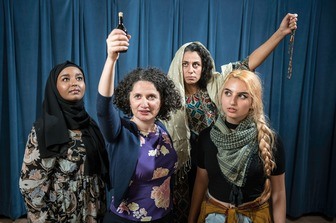REVIEW: Zafira and the Resistance
Zafira and the Resistance is a play about race that can’t seem to decide what it wants to be when it grows up. On its face, Zafira appears to be an attempt at a Margaret Atwood-style dystopian allegory, but it is also a parlor drama about four women from different backgrounds coming together against a common enemy. It is also, somehow, a story about the mystical qualities of olive oil.
Zafira Khoury is a world literature teacher in a high school somewhere in middle America during the rise of a not-too-distant-future internment program for Muslims and people of middle-eastern-descent ironically called “The Resistance.” She runs afoul of this Resistance for teaching about “dead foreigners” from non-European countries (Nelson Mandela), wherein she is promptly shipped off to a camp that is inexplicably housed within the very school she used to teach at. There Zafira meets three other women: a Somali hijabi who is about six months pregnant, a teenage girl who has a Palestinian father and white mother, and a Syrian refugee who speaks no English. They bond over discussions of their favorite food items and about Zafira’s ideas to create a female Muslim superhero who uses empathy (and olive oil) to save the world. Eventually, the Leader of the Resistance announces that the prisoners will be moved to more permanent concentration camps as a “final solution.” This being a bridge too far, one of Zafira’s former students (who’s parents were deported back to Guatemala) comes up with a plan to break her teacher out of the in-school concentration camp (which is still partially run by student guards for no particular reason). The student does this with the help of the school’s custodian/tech-support/
I left a few things out of the above synopsis, but it should be clear that there is a lot going on in this 130-minute play; so much so that there often simply isn’t time for subtlety or nuance. Although it has a few moments where real human emotions and connections begin to emerge, Zafira feels, at best, unfinished–like a table read of a rough draft. This isn’t helped by the actors’ alternatively wooden and overblown deliveries, missed lines, and the painfully explicit references to the Holocaust. The whole story could be told with just the four women in the cell. Everything else is just noise.
From the moment Lina Jamoul delivered the opening line, I was confused about who the intended audience of Zafira was supposed to be. If it is like-minded supporters of diversity, tolerance, and free speech, few of the messages needed to be quite so overt. But if, alternatively, the audience is those who are in some ways opposed to these things, it strikes as callow and one-sided. What you’re left with is a conglomeration of ideas and concepts, but with no clear reason for existing other than congratulating the audience on not supporting racism, casual oppression of minorities, and xenophobia.
The program explains that this play started out with a different title and different story back in 2010, but was adapted to address current political realities. Given the topics addressed in the president’s rally held here in Minneapolis only a few days ago, instead of feeling fresh or timeless, the whole thing just feels quaint.
Now through October 27, 2019 at the Guthrie Theater in Minneapolis. Tickets start at $25.



